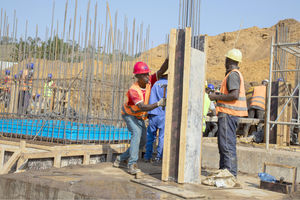Manufacturers’ plea on electricity

Tanesco headquarters in Dar es Salaam. PHOTO | FILE
What you need to know:
- Until 2015 power was the biggest problem business leaders wanted fixed but a survey conducted during July and August last year ranked it sixth as the business leaders perceived that electricity supply had improved.
- Corruption heads the list followed by level of tax; tax administration; access to finance; and macro-economy.
Dar es Salaam. Tanzania’s industrialists are now demanding reduction of the electricity prices after experiencing improvement in the supply of power.
Until 2015 power was the biggest problem business leaders wanted fixed but a survey conducted during July and August last year ranked it sixth as the business leaders perceived that electricity supply had improved.
Corruption heads the list followed by level of tax; tax administration; access to finance; and macro-economy.
The report says power had improved by the time of the survey but the improvement was not uniform across the country.
It was found that power makes business particularly difficult in construction and least difficult for agriculture and agri-processing.
Manufacturing sector which for a long time has been crying of erratic power supply did not find it making life difficult following improvement in both availability and supply.
The Confederation of Tanzania Industries (CTI) says the power situation is slightly stable although they still receive complaints from the members.
“Power is a bit stable in the industrial areas. There are complaints about rationing and outages from industries which are located in non-industrial areas,” says Mr Hussein Kamote, the director of policy and advocacy at CTI.
He says, generally there is improvement especially in Dar es Salaam but the situation may be worse upcountry.
Mr Kamote says if the power stability continues, manufacturers will remain with only one big issue of tariffs which he claims to be too high compared with other countries that were competing with Tanzania in manufacturing.
He says Tanzania charges about 12 US cents per kilowatt-hour; less or equal to the average charged by the East African countries but the manufacturers want it below $10 cents.
“We are comparing with countries like China and India whose products are dominant in Tanzania. Local products cannot compete with those from the said countries because our production costs are too high compared with them,” he added.
Earlier in the year, Tanzania Electric Supply Company Ltd (Tanesco) applied to the regulator to reduce tariffs by at least 7.9 per cent following the commissioning of the own gas-fired plant at Kinyerezi.
However, Energy and Water Utilities Regulatory Authority (Ewura) blocked the bid until a proper cost-analysis study of the investments in gas infrastructure is done.
The regulator said Tanesco’s tariff reduction plan was based on a calculation of the interim gas prices but it overlooked other matrix such as investment on gas infrastructure.
The completion of the 532km natural gas pipeline from Mtwara to Dar es Salaam that would be used to generate low cost power from the Kinyerezi plants was said to be only one aspect of the matter.
By April 2016, Tanzania’s total installed capacity was 1,461.69 megawatts as the demand reached 1,026.02MW.
The problems of power in Tanzania are normally associated with outages, rationing, low/high voltage and pricing as the generation meets the current demand.
Through its 2025 Development Vision, Tanzania eyes to increase the installed power capacity to at least 10,000MW to meet the current and future demand.
To address the current challenges in the electricity sub-sector and attract the required capital, the government of Tanzania has embarked on reforming the Electricity Supply Industry (ESI).
The 2014 ESI Reform Strategy described initiatives for attracting private capital and increasing electricity connection and access levels among other things.
The roadmap’s short term plans include unbundling Tanesco generation segment with independent power producers (IPPs) unconditionally allowed to sell electricity directly to bulk off-takers and pay wheeling charges only to the company responsible for transmission.
In the medium term, the distribution segment will be unbundled from the transmission unit.
In the long term, there will be further unbundling of the distribution segment into several companies.
The proposal to unbundle Tanesco was suggested by CTI but recommended the government to retain transmission.
Financing requirement was estimated at $11.4 billion from 2012 to 2017 – translating into $1.9 billion requirement per annum which 73.5 per cent is for generation, according to the Power System Master Plan.
“Power is still problematic but the government plans are also promising that it will end the electricity challenges,” says Tanzania Private Sector Foundation (TPSF) executive director Mr Godfrey Simbeye.
“My worries are on the speed of implementation…the government is always too slow to implement its good plans,” he adds.
According to him, the power tariffs were still high for the cost of production despite the fact that the charges were slightly lower than the EAC average.
Mr Simbeye says the proposal to unbundle Tanesco was still valid for the electricity subsector to perform well in the country.
“We want power tariffs to go down and I think that is also the intention of our leaders so that the country will be competitive and the local products may compete,” he adds.
Tanzania electricity generation was relying on hyro and thermal sources but with the discovery of natural gas, the focus is changing.
The country has discovered more than 57 trillion cubic feet (TCF) from both onshore and deep sea.




